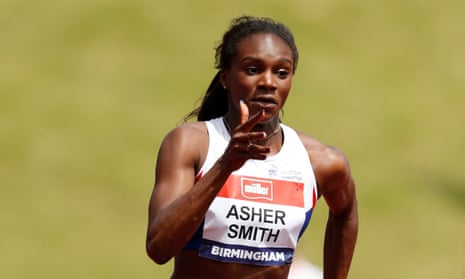“I’ve got to get some muscles on my little chicken wings,” says Dina Asher-Smith, erupting into joyous laughter at the thought. “When I stand next to everyone else I’m like yeah, look how tiny I am!”Britain’s fastest woman is discussing how she intends to step up to the next level for the London 2017 world championships – which might appear a little churlish given she won an Olympic 4x100m bronze medal and gold over 200m at the European Championships this year.
This is at 20 years old while also juggling the second year of a history degree at King’s College, London. But Asher‑Smith, who was also fifth in the 200m in Rio, believes that by upping her training to six days a week from five and spending more time in the gym she can get much stronger – and faster. “There are a lot of stabilisation exercises, making sure that I am a bit more co-ordinated so my muscles work together far better,” she says. “I’ve also been working hard trying to get some abs, trying to get some arms, so I’m really excited for 2017. I can’t wait to race. I feel like a baby that has reins to stop them running around everywhere.”
As Asher-Smith points out, her successes this year were achieved despite missing two months of training with a hamstring problem. A clear run free of injuries should edge her closer to the podium in either the 100m or 200m. But she knows that when she lines up in London next August she could be against the Jamaican double Olympic champion Elaine Thompson, the Dutch world 200m champion Dafne Schippers and the American legend Allyson Felix. “It’s going to be a challenge,” she concedes. “But at the same time you’ve got to use it as motivation. They are not going to go away so I have just got to raise my game and compete.”
She knows that with Jessica Ennis-Hill retiring, Mo Farah promising to quit the track after the championships and Greg Rutherford indicating he will retire in 2018 she is at the vanguard of the younger generation. But if she feels any pressure, she does not show it. “There’s quite a few of us,” she says breezily, name-checking Laura Muir, Adam Gemili and Katarina Johnson-Thompson, “so it’s a compliment when people put me in there. Most sprinters peak in their mid-to-late 20s so hopefully there is a lot more improvement to come. You never know what the future is going to hold but in no way, shape or form do I think that I am at my peak right now.”
Before then she has a dissertation to write, examining the changing image of black men in jazz in 20th-century America, as well as finals to sit. So is she aiming for a first? She puffs out her cheeks. “I’m going for it and it’s not unattainable but there’s a lot of juggling and stress so I have to be realistic,” she says. “I’d be more than happy with a 2:1.”
But Asher-Smith does not intend to settle into the life of a full-time athlete for she knows her brain will get itchy. “After university I will take a break from education but within a couple of months I will probably get bored,” she admits. “I’m going to need to do something that keeps my mind alive otherwise I will go stir crazy.” What that might involve is unclear. Asher-Smith says she is interested in a career in the law or education and wants to learn French.
She believes her studies have given her a deeper perspective too. “What we do isn’t that deep,” she says smiling. “We run in a straight line. The thing I am going to get most stressed about is how fast can I go. The most scary thing is standing on the line and running. How lovely is that, especially when you look at the horrible things people throughout time have had to deal with? I’m going to go out there and do my best and, if it goes well, great but, if it doesn’t, it’s certainly not the end of the world.”
